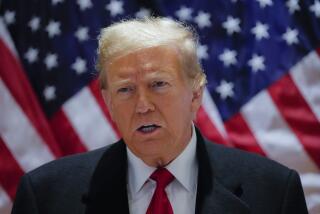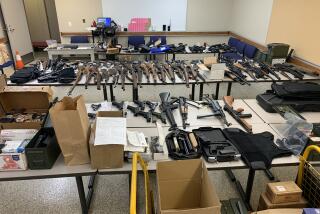Lindh’s Defense Is Dealt a Setback
- Share via
ALEXANDRIA, Va. — A federal judge ruled Tuesday that lawyers for John Walker Lindh cannot conduct face-to-face interviews with detainees at the U.S. Naval Base at Guantanamo Bay, Cuba.
But U.S. District Judge T.S. Ellis III did allow defense lawyers to submit written questions for interrogators to ask the captives from the war in Afghanistan.
The judge also indicated that he likely would allow personal interviews with the detainees if the defense can show that they are needed at pretrial hearings or during the trial itself, set to begin here in August.
Ellis also indicated that, while he agreed with the government’s security concerns about the captives in Cuba, he saw no reason why the Lindh defense team could not go to Norfolk, Va., to interview another detainee, Yaser Esam Hamdi.
Hamdi, who like Lindh was born in the United States, has dual U.S.-Saudi citizenship and recently was moved from Guantanamo Bay to a Navy brig in Norfolk.
He has a hearing in federal court there today on his request to be allowed the right to retain an attorney, even though he has not been charged with a crime.
With that in mind, Ellis said that the security concern over the detainees at Guantanamo Bay “doesn’t apply to this fellow.”
But the judge did agree with the government that deep national security issues could be breached if interrogations were “disrupted” in Cuba to allow Lindh’s lawyers to personally interview 20 detainees who were captured with Lindh in Afghanistan last winter.
The judge has read some classified material provided by the government, and he said that the information coming from the detainees in Cuba “is vital to U.S. national security interests.”
Disrupting that process, he said, could have an “injurious effect.”
The ruling was a temporary setback for the defense, which had hoped to glean additional information from the detainees, some of whom are Lindh’s fellow Taliban soldiers, that might help his case. The defense team is to submit questions next week and will later see videotapes of those questions being asked by U.S. interrogators.
Ellis also cautioned the government several times that at some point this summer the defense will most likely exert its right to personally interview detainees who will be summoned for pretrial hearings and the trial itself.
At that point, the judge warned, the government will have to choose between two conflicting options: to allow disruptions in the interrogation process of detainees at Guantanamo Bay or to “abandon the prosecution” of Lindh, 21, who faces life in prison if convicted of the most serious charges against him, including taking up arms against the United States.
More to Read
Sign up for Essential California
The most important California stories and recommendations in your inbox every morning.
You may occasionally receive promotional content from the Los Angeles Times.











